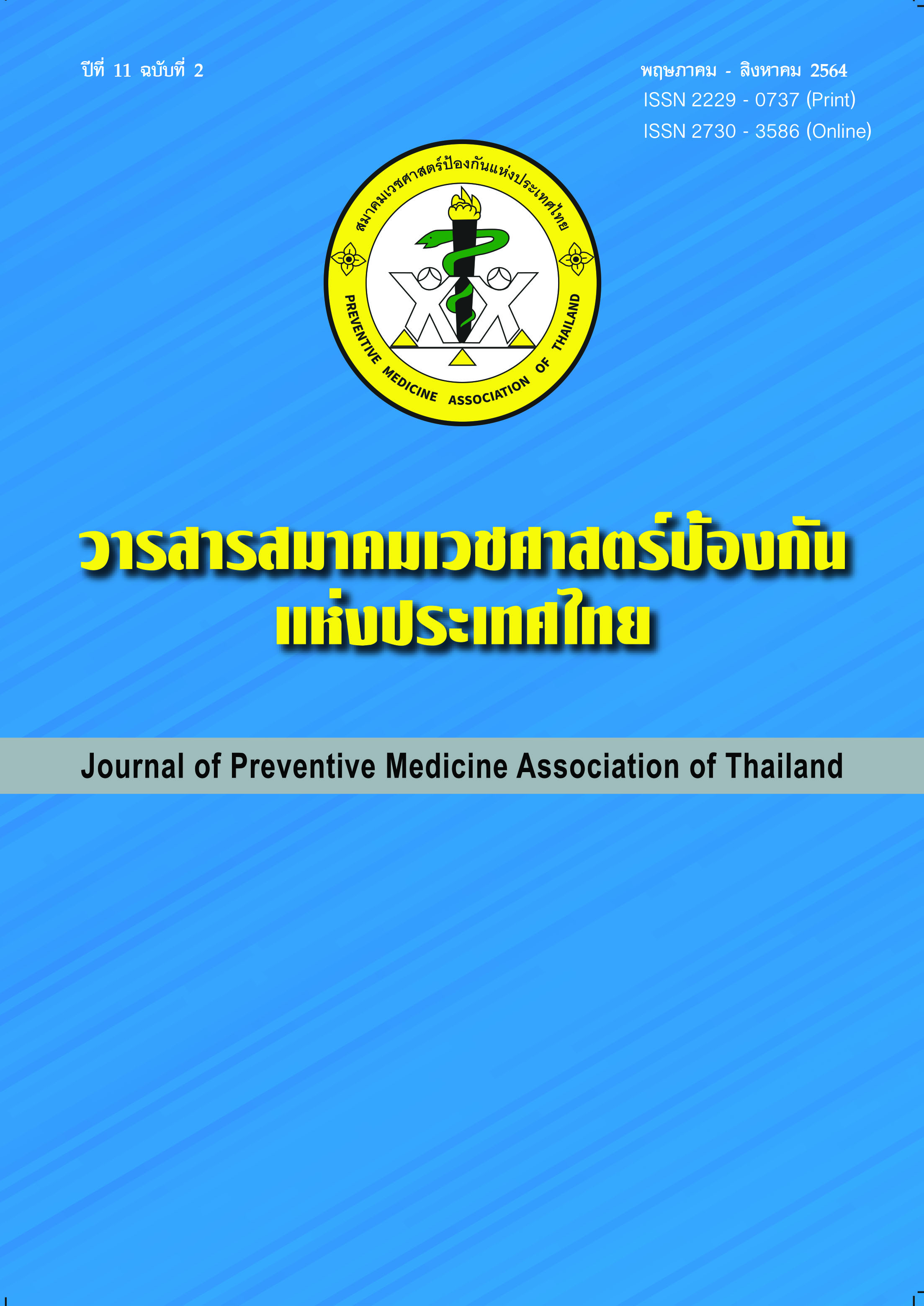The Effectiveness of an Insulin Injection Teaching Program for Diabetes Patients who Treated with Insulin Injection at the Diabetes Mellitus Clinic of Buengkan Hospital
Keywords:
diabetes, Insulin injection teaching program, insulin injections, taking diabetes medicationAbstract
This study was a quasi-experimental design research with one particular group. The aims of study were to compare knowledge about insulin injections and the use of insulin injections before and after applying the Insulin injection teaching program, in order to compare the practice of insulin injections among diabetic patients who treated with insulin injection treatments before and after applying the insulin injection teaching program. Additionally, it is also to compare the formation of nodules on the abdominal skin of insulin injection patients among diabetic patients who treated with insulin injection treatments before and after applying insulin injection teaching program. The samples of this study comprises 186 patients who were diagnosed with diabetes mellitus and treated with insulin injections at the Diabetes Mellitus Clinic of Buengkan Hospital, and were enrolled between May 6 – June 15, 2019. The research tools used for data collection consisted of a general information questionnaire to assess The Information regarding Insulin Injections, and the Use of Insulin Injections, as well as the recording of information to assess the formation of nodules on the abdominal skin of insulin injection patients. The data were analyzed through the use of percentages, mean, standard deviation, and paired t-test statistics, to compare knowledge regarding insulin injections and the use of insulin injections, the practice of administering insulin injections, and the formation of nodules in the abdominal skin of insulin injection patients. The result of the study revealed as follows ; Female subjects were found to be more than male (65.05%), were older than or equal to 50 years of age (56.99%), 45.16% were found to be already married, the highest level of education is at the lower secondary level (38.71%), and are engaged in a trade/personal business (36.56%). The samples had an average score of the knowledge before applying the Insulin injection teaching program at 13.39, and 14.88 after completing the program. When testing for statistical differences, it was found that the average score of knowledge before and after applying the Insulin injection teaching program show a statistically significant difference of p<0.001. The samples had an average score of practice before applying the Insulin injection teaching program at 25.70, and 26.81 after applying the Insulin injection teaching program show a statistically significant difference of p<0.001. Nodules in the abdominal skin formed in 32.80 percent of the sample group before applying the Insulin injection teaching program, and was reduced to only 1.61 percent after Insulin injection teaching program was applied. In summary, Insulin injection teaching program and the related pharmaceutical care at the Diabetes Mellitus Clinic of Buengkan Hospital consists of providing knowledge and understanding regarding insulin injections, teaching about insulin injections, and tracking the formation of nodules on the abdominal skin of patients who treated with insulin injection. Pharmacists play an important role in providing knowledge and practice in guiding patients to utilize the program.
References
International Diabetes Federation (IDF). Diabetes Atlas. 8th ed. Belgium: International Diabetes Federation; 2017.
Buengkan Hospital. Diabetic Patients report. Buengkan: Buengkan Hospital; 2018
Natpatsorn D, Prasit Leewatthanapat. A study of the effects of diabetes education program on HbA1c for patient with type 2 diabetes. Vajira Nursing Journal 2017;19:33-41.
Chanamon Jenjirawat, Tharadol Kengganpanich, Mondha Kengganpanick, Saranya Benjakul. Effects of a Self-Insulin Administration Promoting Program among Persons with Diabetes in Golden Jubilee Medical Center, Nakhon Pathom Province. Rama Nurs J 2017;23:229-41.
Kunthida Kulprateepunya, Petmanee Viriyaseubpong, Reungrungsri Viboonchai, Thitima Kosalawit. Self-Care Behaviors of Diabetic Risk Group in South-Esan, Thailand. The Southern College Network Journal of Nursing and Public Health 2017;4(Special Issue):S19-S33.
Tassamon Namwong, Sumalee Rachaniyom, Rudchanok Klinchat. The effects of self-management supporting program on self-management behaviors in insulin injection among type 2 diabetic patients. Journal of Phrapokklao Nursing College, Chanthaburi 2018;29:112-22.
Chatcharin Kumoh, Rungnapa Chantra. Factors related to self-care behavior among diabetes mellitus patients in sub-district health promoting hospitals, Pattani province. The Southern College Network Journal of Nursing and Public Health 2015;2:85-99.
Downloads
Published
How to Cite
Issue
Section
License
บทความที่ลงพิมพ์ในวารสารเวชศาสตร์ป้องกันแห่งประเทศไทย ถือเป็นผลงานวิชาการ งานวิจัย วิเคราะห์ วิจารณ์ เป็นความเห็นส่วนตัวของผู้นิพนธ์ กองบรรณาธิการไม่จำเป็นต้องเห็นด้วยเสมอไปและผู้นิพนธ์จะต้องรับผิดชอบต่อบทความของตนเอง






